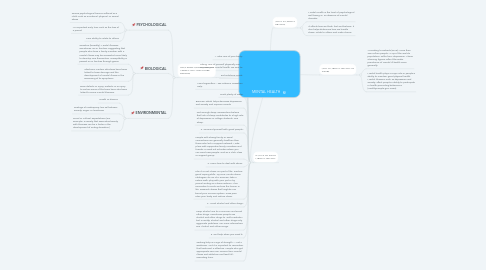MENTAL HEALTH
by Rica Mae Lacanlale

1. HOW DOES MENTAL HEALTH AFFECT YOU AND OTHER PEOPLE?
1.1. PSYCHOLOGICAL
1.1.1. Severe psychological trauma suffered as a child, such as emotional, physical, or sexual abuse
1.1.2. An important early loss, such as the loss of a parent
1.1.3. Poor ability to relate to others
1.2. BIOLOGICAL
1.2.1. Genetics (heredity): Mental illnesses sometimes run in families, suggesting that people who have a family member with a mental illness may be somewhat more likely to develop one themselves. Susceptibility is passed on in families through genes.
1.2.2. Infections: Certain infections have been linked to brain damage and the development of mental illness or the worsening of its symptoms.
1.2.3. Brain defects or injury: Defects in or injury to certain areas of the brain have also been linked to some mental illnesses.
1.3. ENVIRONMENTAL
1.3.1. Death or divorce
1.3.2. Feelings of inadequacy, low self-esteem, anxiety, anger, or loneliness
1.3.3. Social or cultural expectations (For example, a society that associates beauty with thinness can be a factor in the development of eating disorders.)
2. 5 WAYS TO FIGHT MENTAL HEALTH:
2.1. 1. Take care of your body:
2.2. Taking care of yourself physically can improve your mental health. Be sure to:
2.3. Eat nutritious meals
2.4. Avoid cigarettes -- see Tobacco Cessation Help
2.5. Drink plenty of water
2.6. Exercise, which helps decrease depression and anxiety and improve moods
2.7. Get enough sleep. Researchers believe that lack of sleep contributes to a high rate of depression in college students. See Sleep.
2.8. 2. Surround yourself with good people:
2.9. People with strong family or social connections are generally healthier than those who lack a support network. Make plans with supportive family members and friends, or seek out activities where you can meet new people, such as a club, class or support group.
2.10. 3. Learn how to deal with stress:
2.11. Like it or not, stress is a part of life. Practice good coping skills: Try One-Minute Stress Strategies, do Tai Chi, exercise, take a nature walk, play with your pet or try journal writing as a stress reducer. Also, remember to smile and see the humor in life. Research shows that laughter can boost your immune system, ease pain, relax your body and reduce stress.
2.12. 4. Avoid alcohol and other drugs:
2.13. Keep alcohol use to a minimum and avoid other drugs. Sometimes people use alcohol and other drugs to "self-medicate" but in reality, alcohol and other drugs only aggravate problems. For more information, see Alcohol and Other Drugs.
2.14. 5. Get help when you need it:
2.15. Seeking help is a sign of strength — not a weakness. And it is important to remember that treatment is effective. People who get appropriate care can recover from mental illness and addiction and lead full, rewarding lives.
3. WHAT IS MENTAL HEALTH?
3.1. Mental Health is the level of psychological well-being or an absence of mental disorder.
3.2. It affects how we think, feel and behave. It also helps determine how we handle stress, relate to others and make choice.
4. WHY IS MENTAL HEALTH AN ISSUE?
4.1. According to Roberts (2018), more than 300 million people, 4.4% of the world's population, suffer from depression. These alarming figures reflect the wider prevalence of mental ill-health more generally.
4.2. Mental health plays a major role in people's ability to maintain good physical health. Mental illnesses, such as depression and anxiety, affect people's ability to participate in health-promoting behaviours (HealthyPeople.gov, 2020).


